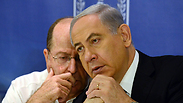
'Ministers' reliance on information IDF chose to present creates dangerous situation of groupthink'
צילום: חיים צח, לע"מ
What cabinet's military discussions should actually look like
Op-ed: Instead of delving into details of plan presented by IDF, ministers should discuss different alternatives and select best option.
On the backdrop of the political dispute between Defense Minister Moshe Ya'alon and Economy Minister Naftali Bennett, three fundamental questions are raised and should be addressed.
The first question has to do with the correct way to treat former officers, who enlist themselves at a time of war, like former chief military rabbi Avichai Rontzki allegedly did.
I think we should separate between different situations: There are those who have been discharged from service or have not been recruited by law, and still feel that it is their duty to volunteer, to take risks, to fight – a phenomenon which has led to a significant contribution in all of Israel's wars and is seen as volunteering in its purest sense, and should therefore be nurtured.
On the other hand, there are those who visit the headquarters and try to get involved, whether in order to know what is going on or in order to offer advice – and this is an unnecessary phenomenon which is sometimes accompanied by a certain impersonation, and should therefore be condemned.
The second fundamental question has to do with cabinet members' sources of information. A cabinet member, whose vote can be crucial, has the right and even the duty to try to be aware of the fullest state of affairs. He should be allowed to coordinate a visit at every unit, meet with functionaries and see every piece of classified material, thereby directly creating the ability to know what is going on.
In Israel it is acceptable that such a right is given to members of the Knesset's Foreign Affairs and Defense Committee, while making things difficult for members of the executive authority – the ministers.
The ministers' reliance solely on information that the defense minister and IDF chief of staff chose to present during formal meetings creates a dangerous situation of groupthink and overly basing decisions on existing conceptions.
The third fundamental question, and the most important one, refers to the way a cabinet discussion on a military issue is held. In these discussions, most of the time is dedicated to providing information – both intelligence information and information about activities which have already been done by our forces.
Too little time is dedicated to the question of what should be done, and when this issue is discussed, the procedure is that the army presents its plan and the discussion revolves around that. This creates a methodological and essential problem – a dichotomous situation in which the cabinet members can approve or oppose what is suggested. Who says this is the entire scope of possibilities?
Moreover, when the scope of the discussion is limited, one easily falls into the trap of details. The ministers ask questions about the details of the suggested plan, the discussion is prolonged, and that creates the erroneous impression that a "thorough" discussion is taking place.
If on the tactical level there is indeed a great similarity between delving into details and thoroughness, on the strategic level it's the opposite situation: Delving into details leads to a shallow discussion. So the ministers should ask the following question: "What were the other alternatives you examined, and why did you choose this alternative and not any of the others?"
The real discussion, therefore, should not deal with the details of the suggested plan, but with selecting the right way from a number of possibilities.
When one looks at the way government and cabinet meetings have been conducted since the Yom Kippur War, through the first Lebanon War, the Second Lebanon War and up to now, this seems to have been the main problem. The ministers engaged in details, including details about the IDF's ability which they should have studied before the operation, and too little time was dedicated to a thorough discussion of strategic questions like the identity of the enemy, the operation's goals or the possible achievement of the different alternatives.
Major-General (res.) Giora Eiland is a former head of Israel's National Security Council.










